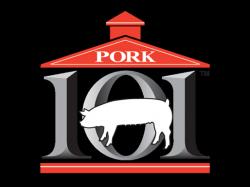AMSA Announces 2014 PORK 101 Courses
February 7, 2014 | 2 min to read

Champaign, IL – The American Meat Science Association (AMSA) is excited to announce that the 2014 PORK 101 course will be held May 20-22 at Texas A&M University; August 12-14 at University of Nebraska and October 13-15 at Iowa State University. PORK 101 is hosted by AMSA in cooperation with the National Pork Board and is sponsored by Elanco Animal Health.
Attendees will experience firsthand in the selection, evaluation and fabrication of their pork carcasses. As well as, the importance of hog handling, grading, food safety and much more. The course concludes with the attendees preparing and sampling products from pork carcasses including pumped loins, bacon, hams and sausage.
These attendees will have the opportunity to learn about the value differences in swine, pork carcasses, pork primals and processed pork products from meat science faculty and AMSA members at each university.
Past attendees of the AMSA PORK 101 Course can attest to the importance of attending.
- I can speak to the entire process of how pork in harvested now. Understanding the primals and the bone-in/boneless cuts is very important in my role.
- This course provides an excellent foundation for anyone and all people working in the pork industry.
- Great course! I felt like the hands-on cutting was a great learning tool where I grew more familiar with each of the cuts of pork.
PORK 101 is co-sponsored by the American Society of Animal Science (ASAS), North American Meat Association (NAMA) and the Southwest Meat Association (SMA).
A special thank you goes out to Elanco Animal Health, a company dedicated to enhancing animal health through science and innovation.
For more information or questions regarding PORK 101 please visit: www.pork101.org or contact Deidrea Mabry dmabry@meatscience.org.
AMSA fosters community and professional development among individuals who create and apply science to efficiently provide safe and high quality meat (defined as red meat (beef, pork and lamb), poultry, fish/seafood and meat from other managed species).
Source: American Meat Science Association (AMSA)
